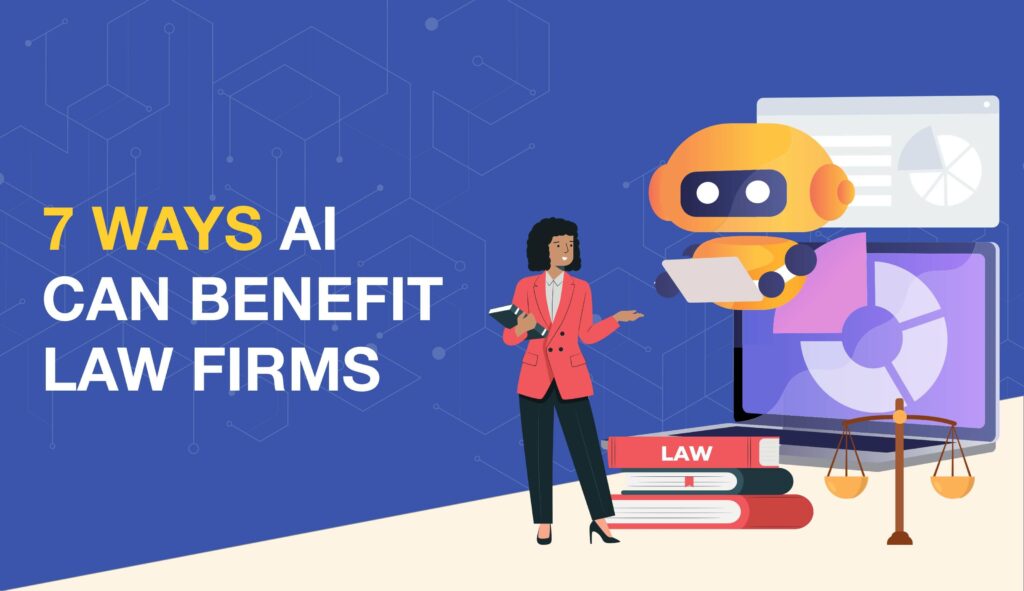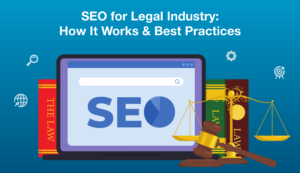Artificial intelligence (AI) and machine learning (ML) will both play critical roles in shaping the future of law firms. The global market for AI in law firms is expected to reach $1.23 billion by 2028. As a result of such meteoric growth, the law firms of tomorrow will have access to a robust set of ML and AI technologies, as well as other such “Legaltech” (legal technology) that will promote efficiency and streamline organizational workflows.
That said, AI in law has already become commonplace. A survey of a big US law firm conducted in 2017 found that over 36% of law firms are either currently using or actively exploring the use of AI systems in their legal practices. With that in mind, let’s shift our attention to how attorneys can use AI in law firms.

How Can Lawyers Use AI in Law Firms?
Using AI and machine learning in law firms empowers attorneys and their teams to be more productive. Legaltech also enables lawyers to be more client-centric, reduce the time spent on tedious administrative or non-billable tasks, and focus their energy on delivering desired results for those they serve.
Check out below some additional use cases for AI and machine learning in law firms:

Contract Review and Analysis in Less Time
The future of law firms will be built around the concept of process automation. In other words, attorneys will automate as many redundant and tedious processes as possible to ensure that they can engage in more dynamic work. Forward-thinking attorneys have already turned to automation to alleviate one of their most persistent administrative headaches: contract review and analysis.
AI systems can evaluate contracts to verify that all of the required documents are present. A robust solution can define required conditions and clauses, identify discrepancies, and help lawyers pinpoint potential issues that need to be resolved.
Contract In-Depth Analytics
Machine learning and AI platforms are ideal for the finer points of contract analysis, and attorneys can leverage these tools to maintain control over outstanding commitments and ensure that all contract conditions are met.
In particular, the analytical capabilities of AI are appealing to small law firms, as they can help level the playing field with larger firms by providing access to sophisticated data analysis and insights that were previously only available to larger firms with greater resources. For example, an AI-powered legal research platform can empower a small law firm specializing in employment law to efficiently analyze a multitude of court cases, identify emerging trends in discrimination claims, and extract valuable insights on prevailing legal arguments, enabling them to offer strategic counsel to clients on par with larger competitors. This type of technology can enable small law firms to better understand their clients, cases, and the market, which can help them make better strategic decisions and compete more effectively.
High-Quality Work
At a more granular level, legaltech can elevate a firm’s quality of work, as attorneys can use AI-powered tools to facilitate more efficient document management, thus keeping critical files organized and preventing vital case details or supporting documents from getting lost in the shuffle.
Solutions that feature contract comparison tools can identify missing clauses or incorrect terms as well. The platform will then notify the attorney so that they can manually review and remedy any document discrepancies.
Ease of Legal Research
Conducting legal research is a foundational element of any legal practice. Through AI assistance, attorneys can decrease research time and devote more of their day to billable tasks.
More importantly, attorneys can replace anecdotal information with verifiable facts that are backed by primary sources. They can then use these more reliable facts to help clients better understand the specifics of their cases and remove ambiguity from complex legal processes.
Elimination of Time-Consuming Tasks
Time-consuming legal tasks could be completely automated with existing legaltech. Embracing the automation capabilities of legal technologies will enable lawyers to spend less time on document-based work and devote their talents to strategic legal matters.
For instance, leading AI legaltech platforms include e-discovery tools, which can analyze case data and enable lawyers to search for particular terms or clauses, meaning lawyers can quickly retrieve or locate information from documents without manually reviewing them line by line.
Litigation Prediction and Analysis
Innovative AI teams are working to create algorithms that can actually predict the outcome of pending litigation. These algorithms tap into historical data to expedite settlement negotiations, decrease trial volume, and accelerate case resolution processes.
Furthermore, AI solutions can analyze precedents and help lawyers prepare documents when requesting settlements. Ultimately, these capabilities will benefit both the client and the firm’s bottom line.
Provide a Better Client-Centered Experience
All of the advantages associated with AI and machine learning in law firms boil down to one key factor: saving time. When attorneys implement AI to reduce labor and save time, they can focus more on their clients, and providing a client-centered experience is great for a firm’s brand image. Clients will feel as though the attorney is dedicated to their case and obtaining a favorable resolution.
Lawyer AI Tools
While there are many different AI-powered legaltech solutions on the market, the five following options are some of the most dynamic:
Kira Systems uses ML technology to facilitate contract analysis. Its tools can efficiently extract data from legal documents, identify clauses, and pinpoint other key contract terms.
As a no-code legal application development platform, Neota Logic enables legal teams to create their own custom apps. With Neota Logic, users can develop chatbots, automation tools, and more.
Casetext uses natural language processing (NLP) to facilitate legal research and help lawyers rapidly locate statutes, case laws, regulations, and other supporting documents, making for an excellent brief analysis tool.
ROSS Intelligence uses NLP to assist with legal research and features a built-in chatbot feature that legal professionals can use to support their research activities. The bot can answer legal questions and help users find relevant documents.
LawGeex supports contract review processes with its robust AI and ML solutions. It can identify potential contract discrepancies, support compliance efforts, and provide lawyers with actionable insights into contract clauses and terms.
Ready to Embrace AI for Law Firms? You Need a Great CRM First
The tools above are all highly rated and have received positive feedback from law firms. As such, they can help your practice streamline operations, provide higher quality service to its clients, and reduce costs, but before putting these tools to work for your practice, you must ensure that all of your client data is organized, accessible, and consolidated.
To do that, you will need a customer relationship management (CRM) solution for law firms, and if you’re a Mac-savvy lawyer, Daylite is the CRM platform for you. Our award-winning CRM application includes everything you need to get organized and prepare for the future of law firms. So you can spend less time managing your law firm, and more time focused on doing what you love. Check out this legal industry page and see how Daylite can help you gain control of your legal firm.
About the author: Tucky Wong is Marketcircle’s Senior Marketing Manager. With a wealth of Marketing experience that spans nearly two decades, her expertise has become an invaluable asset in the world of small business empowerment as she’s the great mind behind impactful content and strategies. Tucky’s commitment to empowering small businesses ensures that every strategy and piece of content resonates with the spirit of growth and achievement.


